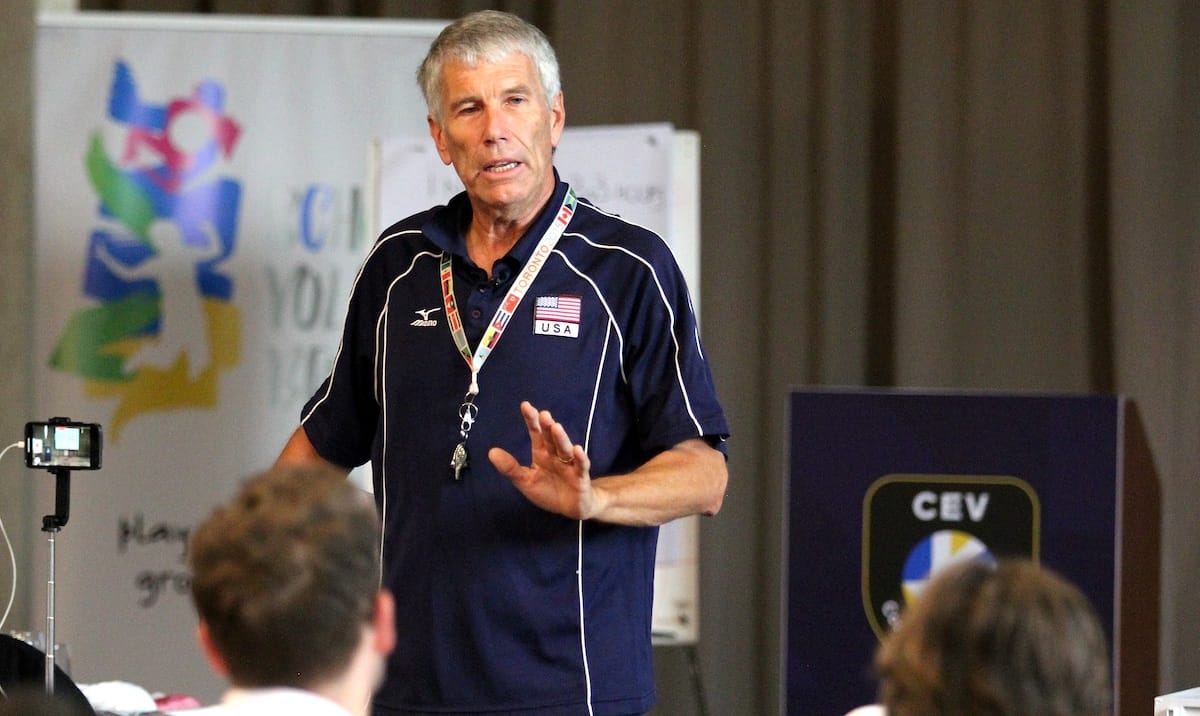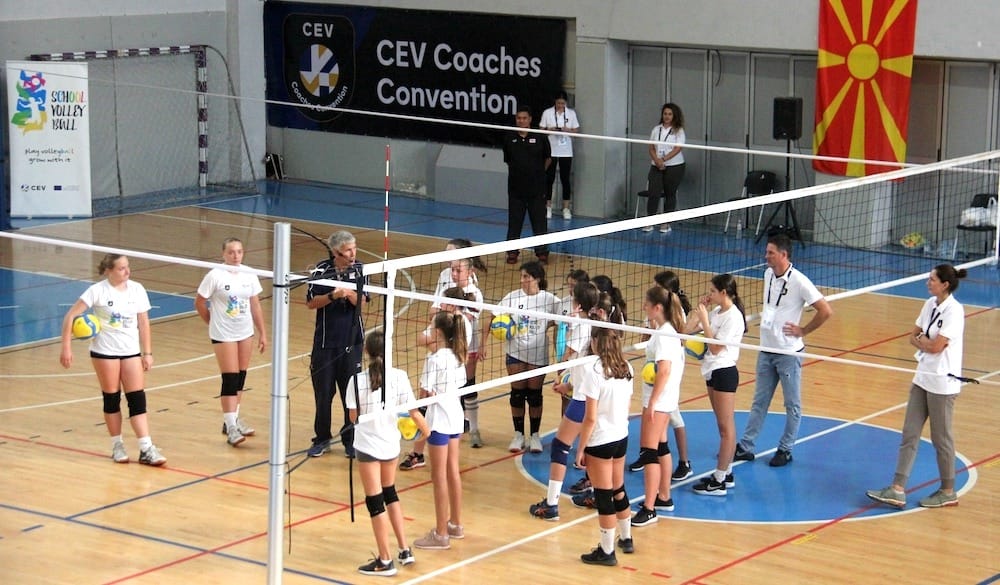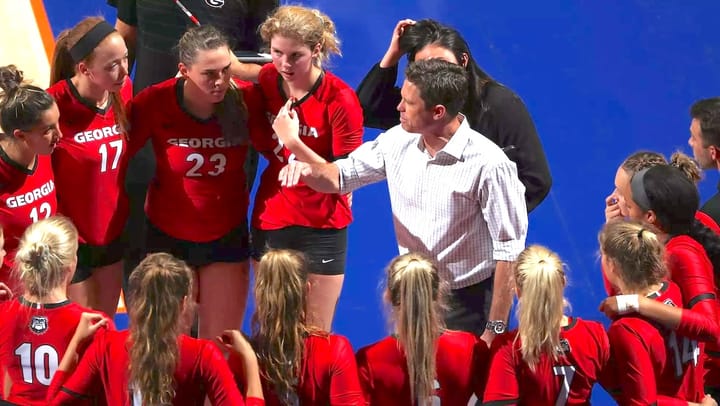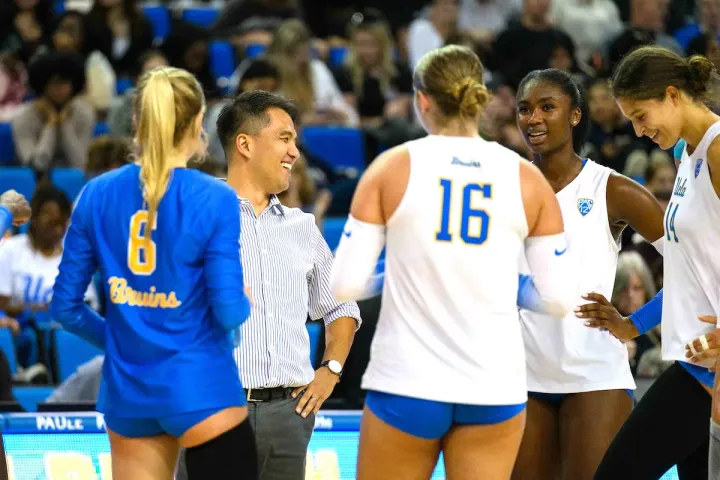69. John Kessel: The coach who knows why, beats the coach who knows how.
In this Masterclass with John Kessel we went all over the place...and instead of filtering out John's answers to fit our 'standard' VB questions, I kept the edit a bit more rough. Missing out on some of John's insights would be a pity.

When someone is great at telling stories, you've got to let the man tell his stories. 😊
John Kessel's name is synonymous with helping coaches become the best teachers they can be. Teachers who become ambassadors of our game. A game that's played for life.
It's impossible to give full credit to John's career in a few lines, John served and is serving all facets of our sport for over 5 decades.
As the USA Volleyball's director of sport development, as a board member for World ParaVolley, as a FIVB Level IV instructor, having conducted thousands of seminars and clinics all over the world, and so on...
What John covered:
- The importance of the present moment during timeouts.
- Advocacy for positive language in coaching.
- Discussion on the role of confidence and character in players.
- Insights into the development and pipeline in volleyball.
- Importance of nurturing all-around skills at younger levels.
- Stressing the joy of playing and long-term athletic development.
- Strategies for engaging inclusive training methods.
- Perspectives on nurturing talent and the future of volleyball.
- And many more subjects and stories, ...
There are 13 video clips in this article for over 80 minutes of video.
At the bottom of the page, you can find John's definite list (it's a long one :-)) of ultimate coaching resources.
Enjoy!
On timeouts
I have a couple of thoughts on this, a little stream of consciousness about timeouts. First, it's really important for coaches to understand that every situation, it's got a past, present, and future.
But since you can't control the past, forget about it.
I remember Marv Dunphy in our gold medal match against Russia in Seoul. Timeout at 7-13, he pulls them together and says, "Hey, one point at a time, this point, Karch, I want you to..." And he was very specific about that point.
As a young coach, I was worried about all the things that might happen down the road and all that had just happened or whatever...
Now, I'd say, look, focus on what you can control, which is this next point. Forget about the other stuff. And you also need to be pretty positive.
There are words I want to get rid of in the gym, and one of them is 'don't. My timeout story, some of my Italian friends remember me doing this in the early '80s. Long story short, we're playing this big match, we're winning for the first time against them in 17 years. It's an away match, and we're up, old score, 13-5. So it's pretty much over, because we're up 2-0.
My setter and my middle blocker serve the bottom of the net, then we rotate, and I go back to serve. My coach yelled: "Non battere la palla nella rete" - "Don't serve the ball in the net"
I said okay, and in front of a few thousand fans, I served the ball backwards into the crowd. Still 13-5, then we got another point, I think I hit a pipe, and we won. And in the locker room, my coach goes, "Che cazzo fai!" - "What the **** are you doing!"
I said, "I think you told me, don't serve in the net." He said, "That's exactly what I told you." I said, "I didn't." I brought in a couple of players and I said, "Tell him what you're thinking when a coach says, don't serve in the net." They all said, "We're thinking about serving in the net, coach." And I said, "You're a good coach, but incredibly negative. Get rid of 'don't.'"
Tell us what you want, not the 10,000 things you don't want. But tell us the one or two things you want us to do. Focus on that.
And then, you know, you go out to dinner until 2 a.m. and celebrate the win. And the next Monday in the gym, you know, he almost overnight stopped using the word 'don't.' That's a word that should be outside of our gym.
Words matter. And that's one of the biggest ones, especially in a timeout. It's kind of funny, in a timeout, you can see if the team is doing well, they're really tight. And when they aren't doing very well, they expand out like a flower to stand further away from the ranting and the yelling that's going on.
It's really important for new coaches, and even experienced ones, to understand that nobody's making a mistake on purpose. Stop treating it like they are and start discussing with them as leaders how to lead the team out of the situation. Starting with that next point. Because that's all you can control.
Laurent Tillie talked about character. Once the players are in the court, it's more about the character they convey. It's about being confident, not about boasting or being aggressive. Mistakes are part of the game, but seeing players confident in their actions, that's all you can ask for. If a player isn't confident, the only thing to do is get him out of the game as quickly as possible.
Well, and I think we need to help athletes that come from other sports realize that in our sport, everybody's looking at everybody all the time, essentially. At least during the breaks that you're talking about. Because when I'm guarding you in basketball the whole time, I'm just looking at you, you know, and I don't see the body posture, the lack of confidence of other people.
You don't see it in the vast majority of sports, but in volleyball, you're sitting there on the smallest thing around, a volleyball court with 12 players, making it pretty population-dense, looking at each other through the net the whole time. And you see one person a bit weaker, like the coach said, and the other five may be confident, but everybody gets to see the one whose body posture is given up, and boom, that gives them strength.
In a timeout, you're kind of six starters against six starters with a head coach. But if the head coach starts to be an ass or, you know, thinks that chewing me out is going to help me play better, it's now eight on six, not seven on seven. And you know, don't give them that strength. Don't give them any of that power.
Be part of my team and trust that your practices have helped us be as good as we can be right now, because it's a journey. It's a process.
Bill Walsh wrote this great book, and the title of the book is the most important.
"The score takes care of itself."
If you do all these pieces of the journey, you're more likely to win.
Development and pipeline
It's important for your people to know that in 1995, I did a research study for the FIVB as part of being on the technical and coaches commission. We studied every match played since the sport began. It took years, but we finally got all the data together.
The number one thing we learned about our sport is that, yeah, 50 percent of the teams lose. First off, we didn't do that study. That's just a storytelling joke, but the fact in our sport is, you don't tie, you either win or lose.
In a million matches played all over the world today, half of the teams lost. That's just the facts. Yes, we want to work on the process that lets the outcome take care of itself.
But even there, if I think about our two situations between Rio and Tokyo for the women's team. Karch had a great team, they swept their pool, that whole side. And everybody in our pool beat every other team in the other poule. Four beat one, two beat three, three beat two. We were on track for clearly a gold medal, but our number one hitter, statistically, and in the entire Olympic Games, hurt her knee.

The player that came in was not as strong as we needed for that next match. And we lost, I think, 15-13 or something. And then we went on to win the bronze. But where I saw Karch do so much processing from 2016 to 2020/2021 was he continued to build a really deep team so that in 2021 when the injuries occurred, we still won a gold medal because we had more depth.
That's harder to do at the younger levels. It's easier to do at the 2 percent level, but at the 98 percent level that I live at, you have to take your 12 and get them to play all the positions because at the younger levels, you never know who's going to go out.
Or who can't be there because of homework or a funeral in the family or other reasons. They're not pros. They're learning to love the game through your messages and how you work with them.
You've got to have much better all-around players when they're younger, and then that feeds the pipeline upwards to get them to be more specialized if that's what they choose to do. As we talked about that, the 98 percent that feeds the 2 percent.
Let's talk about this huge funnel or pipeline, that you should have if you want to arrive at that 2 percent, if you want to arrive at that gold medal. There can always be luck, there can always be whatever, but you need a huge funnel to start with, to end up at this elite international level.
At least in the six on six! That's the beauty of smaller-sided rugby, three on three basketball, and two on two doubles volleyball. Latvia can win a medal where they're not going to get into it in the six on six world, but Olympic volleyball doubles helps that pipeline be smaller for smaller nations.
I was doing an FIVB course and helping develop the athletes from Vanuatu who have come so close to getting to the Olympics, but Vanuatu is a tiny island. I mean, it's 180 islands as their country, but they don't have that many players and they don't have many kids. But they can do doubles.
So the pipeline is still incredibly important. In fact, it's more important to do it well there because you don't have as many players. You know, the whole throwing a basket of eggs against the wall and picking out the three that don't break. That's not good development.
You want to keep everybody healthy as long as possible and in as safe an environment as possible.
The future of our sport
One of your questions is about the future of the game and what changes I would make. Working with the sport for over half a century as a coach, I love the rule changes that keep the ball flying. When I played in the Olympics in '84, you could serve and block. So, there was no rally there. But you also got called for a double hit on reception all the time. The ball would shank, the rally would end, and it felt unfair. The problem was the shank, let us chase it down.
They made that change. The hands were so tight, but they loosened them up, while maintaining a standard of excellence. What's important for kids and for the Olympics is that every spectator loves the rallies, not just the jump-serve kills. Sure, if you're trying to win you're excited about those kills, but they don't showcase much volleyball.
In the IVA, we had all the '76 Olympians. For example, Skorek was our setter. Mikasa attempted to make a ball that wouldn't fly as fast, giving players a better chance to dig the ball and keep it flying.
I see similar developments in tennis and even baseball. What I admire about your country and Europe is that you don't have sports like baseball and American football, which attract top athletes.
There is this photo of an engineering building with a sign that says 'Facts, not opinions.' A picture that Carl McGown always shared. I love that phrase. When we play our sport, the rallies is what makes volleyball fun at every level. If you want to make your son love volleyball, play balloon volleyball with him over a string.
The more he plays at his age, the more he'll love the sport.
One of the most intense matches I've ever seen was Steve Timmons against Karch Kiraly before the '84 Olympics, playing balloon volleyball over a table.
I think it was at Bill Neville's house. It was very intense.
I'll just leave it at that. It was intense because they were desperate to win with this damn balloon, which made it harder to stop the rally. It's those kinds of modifications to the game, to keep the ball flying, that I think we need more of.
And I love the rule changes that do allow that.
Again, in '96, we passed that big rule about the whole body being playable, because up until then, it was waist and above. Probably when you played, it was waist and above.
You'd be digging, and it'd rocket off your leg or foot, and they'd call it, making the below-the-waist signal. Get rid of that rule. He's almost exactly where he should be, and he dug it. Let him keep playing. Let's keep the ball flying.
That's part of the joy of what we need to bring to our sport, for sure.
Possible reasons for Team USA successes
Yeah, it's amazing how, I mean, in your case, you're creating these opportunities for VolleyBrains to share. In my world, it was somewhat happenstance.
My friends and I, we wanted to play volleyball, we loved outdoor doubles, so we started a men's team. That was back in 1970, together with friends I'll see 50 years later at our college reunion. And a gal named Marla Borowski from Kansas, she came up and said, 'Would you start and coach our women's team?'


